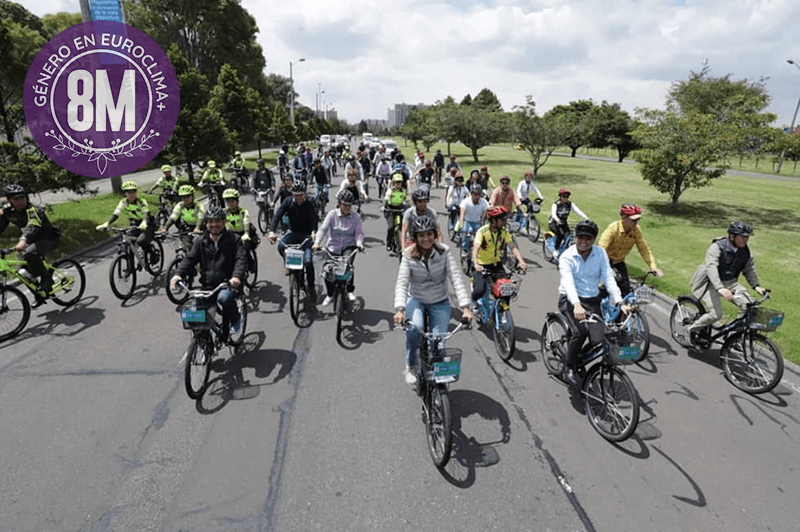The EUROCLIMA+ programme makes visible actions that include a gender perspective to meet differentiated mobility needs.
11 March 2022 - Urban mobility is fundamental in offering quality of life to all people in cities. Planning and implementing measures to improve it are increasingly necessary for providing better living conditions. To achieve truly sustainable and inclusive cities, it is important to understand that all people have different needs and experiences in their daily mobility.
Historically, these differences have not been taken into account in mobility planning in cities, which affects women the most. Therefore, their participation in the spaces and stages of mobility initiatives is key for the design of policies and implementation of projects that are suitable, safe and inclusive for all people: women, children, people with disabilities, older adults and other differentiated groups.
From 8 to 11 March, the EUROCLIMA+ programme and its Community of Practice “Platform for Sustainable Urban Mobility in Latin America” developed events and actions to make visible and recognise the impact generated by women in different cities and countries in Latin America..
The experiences, best practices, benefits and impacts developed in the region are presented below.
National Active Mobility Strategy with a gender-differentiated approach

With the aim of leaving no one behind and meeting the differentiated needs of people for active mobility, the Colombian Ministry of Transport is developing the National Active Mobility Strategy (ENMA) with a gender-differentiated approach.
This initiative, supported by the EUROCLIMA+ programme, will define a series of guidelines that will allow regional and local governments to promote and encourage active mobility, understanding the differences that exist in the different territories of the country.
The team working on the ENMA is mostly made up of women, who shared their experience of the implementation of this project, which is currently in the diagnostic phase.
#Mobilidad8M: Women Moving Latin America

On 10 March, the Sustainable Urban Mobility Platform, with the participation of German Development Cooperation (GIZ) and the United Nations Environment Programme (UNEP) organised the virtual event #Movilidad8M: Women Moving Latin America, a virtual conversation space that brought together women from various cities and countries in Latin America to talk, from their perspective, situation and involvement in the sector, about their work and how this has had an influence on generating a gender vision in urban mobility in Latin America.
The event brought together 222 people via Twitter. Participants included Amarilis Ulloa from Mibús, Panama; Sheyla Guerrero from the Instituto del Transporte, Dominican Republic; Andrea San Gil León, Founder of Expo Bici and Centro Sostenibilidad Urbana, Costa Rica; María Fernanda Ortiz, Mobility Consultant in Colombia; Jone Orbea from UNEP's MOVES project; and Miriam Monterrubio from GIZ/EUROCLIMA+.
Cycling mobility study: key data on women and urban cycling

Active mobility plays a key role in the updating of the Integrated Sustainable Urban Mobility Plan (PIMUS) developed by the Metropolitan Planning Institute of the Guadalajara Metropolitan Area (IMEPLAN) with support from the EUROCLIMA+ programme.
In order for the PIMUS to include targeted actions and public policies that contribute to an increase in cycling trips, the Cycling Mobility Study was developed, which included in its methodology the disaggregation of information by gender, in order to have a better picture of women's particular needs and difficulties for Bicycling trips.
Some data, such as lack of knowledge about cycling, different travel patterns, as well as different perceptions of road safety and sexual harassment in the public space, have been of utmost importance for the construction of targeted actions.
Gender and mobility data in Latin America

The lack of information and studies from a gender perspective makes it difficult to generate initiatives that take into account the particular mobility needs of women and other differentiated groups. To raise awareness of this problem and to publicise the information that does exist, graphic materials with key data on gender and mobility in Latin America were shared during the week.
These materials are available on the social networks of the Latin American Sustainable Urban Mobility Platform.
Through its Gender and Vulnerable Groups line of action, the EUROCLIMA+ programme strengthens mainstreaming of the gender perspective in policies, plans and actions related to Nationally Determined Contributions (NDCs). In this way, it incorporates gender equality and promotes inclusion in its projects and actions, including those for urban mobility.
As part of these efforts, the EUROCLIMA+ programme supports initiatives such as the third edition of the Urban Women Leaders course by Women on the Move.
To learn more about the topic of gender in EUROCLIMA+, the event “Promoting a just and inclusive green transition: mainstreaming the gender perspective in polícies and processes in Latin America and the Caribbean through EUROCLIMA+” will take place on 16 March.
About EUROCLIMA+
EUROCLIMA+ is a programme funded by the European Union and co-financed by the German federal government through the Federal Ministry for Economic Cooperation and Development (BMZ), as well as by the governments of France and Spain through the Ministry of Foreign Affairs, European Union and Cooperation.
The Programme's mission is to reduce the impact of climate change and its effects in 18 countries in Latin America and the Caribbean, promoting mitigation, adaptation, resilience and climate investment. It is implemented according to the "Spirit of Team Europe" under the synergistic work of seven agencies: the Spanish Agency for International Development Cooperation (AECID), the French Development Agency (AFD), the Economic Commission for Latin America and the Caribbean (ECLAC), Expertise France (EF), the International and Ibero-America Foundation for Administration and Public Policy (FIIAPP), the German Society for International Cooperation (GIZ) GmbH, and the UN Environment Programme (UNEP).
For more information:
movilidadurbana@euroclimaplus.org

